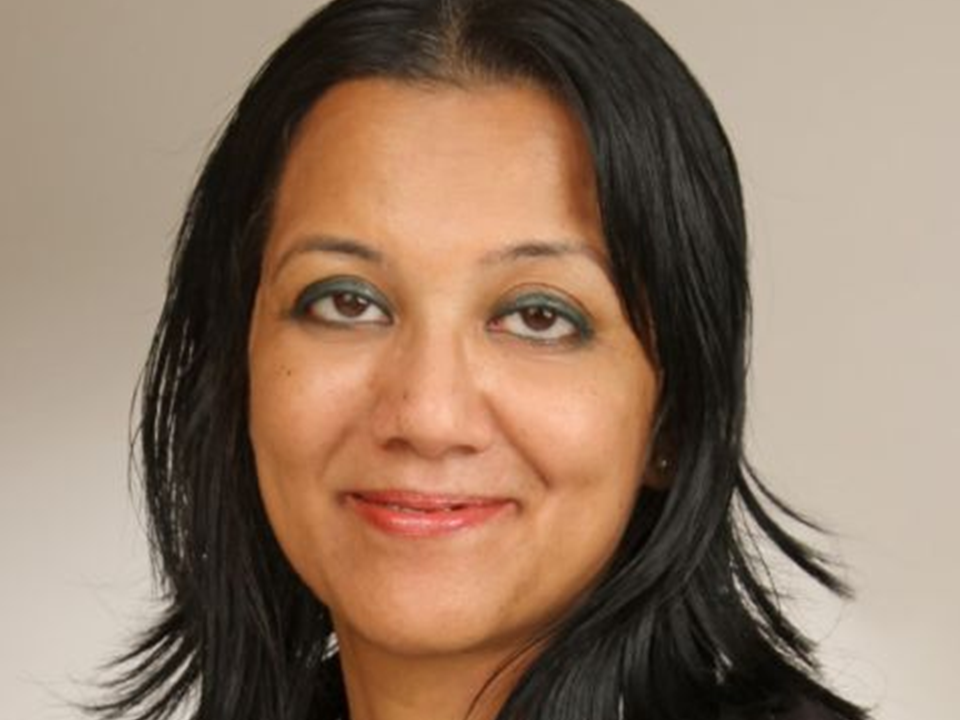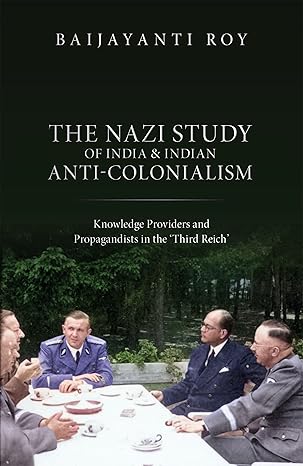Dr. Baijayanti Roy, an Indian-born historian based in Frankfurt, studies the intertwined histories of Germany and India in the twentieth century, particularly during the Nazi era. Her research traces how German scholars and political actors engaged with Indian nationalists such as Subhas Chandra Bose, blending ideology, ambition, and opportunism. By revealing how academic knowledge of India was co-opted for Hitler’s Nazi propaganda, Roy highlights the enduring links between scholarship, power, and politics – and the echoes of völkisch thinking that still resonate in strands of modern Hindu nationalism.

Dr. Roy, you grew up in India and are now conducting your research in Germany – what motivated you personally to pursue your academic career in Frankfurt, and why Germany in particular?
Both my parents were famous historians who did their PhDs at Sorbonne in Paris. They knew French quite well and had European friends who visited us. My parents also visited France regularly. So I was exposed to European thoughts and culture from a very young age. My interest in German history, however, is inherited from my father. Though he was a scholar of medieval India, he was very interested in the history of the ‘Third Reich’ and had books on the subject. When I was about 16-17, I read some of these books and was fascinated by them. Then I studied History at Presidency College and at Calcutta University. My focus area during my Masters was modern Europe, particularly Germany, from the time of German unification in 1871 to the end of the Second World War in 1945. At that time, I dreamt of pursuing a PhD in Germany on the Nazi period. I thought it would remain just that – a dream.
It was just by chance that I came to Germany with my husband who had found work in private industry here. It was also by chance that we landed up near Frankfurt after spending more than five years in Pforzheim in southern Germany.
When we shifted to the Frankfurt area, I was determined to fulfil my dream of doing a PhD on Nazi Germany. I was, however, not thinking of pursuing an academic career as such. We had two children after coming to Germany. I had to be a full time mother and a full time housewife since my husband was ever so busy (he still is…) Doing a PhD was also my way of giving myself an intellectual space, a life of the mind as separate from all the parental and household work that were threatening to engulf me.
Your central interest lies in the entanglements between Germany and India in the 20th century. How did this focus develop for you, both biographically and academically? Was there a key moment that shaped your research trajectory?
As I said, my primary interest was in knowing more about Nazi Germany. My PhD, which later became my first published monograph, was on Albert Speer, Hitler`s architect and later his Minister for Armament Production. I enjoyed doing the PhD so much that I wanted to do more research on Nazi Germany even though the German academia is not welcoming to perceived ‘outsiders’ like me – a woman of colour who was neither born nor raised in Germany.
While doing my PhD, I was becoming aware of different kinds of historical connections between Germany and India. On the one hand, there was the iconic Subhas Chandra Bose and his time in Berlin. On the other hand, there were generations of German Scholars who were academically interested in India, particularly ancient India and Sanskrit whom I found interesting. Why were these scholars interested in Sanskrit? My initial research on Max Müller yielded some insights including some intriguing connections between German Indology and Nazism. Particularly inspiring for me was Sheldon Pollock`s article on the ways in which some German Indologists used their knowledge of “Aryan India” to legitimize aspects of Nazi worldview. I realized that not much work has been done on the subject and decided to delve deeper. I integrated the other subject of interest – the entanglements between Bose`s anti-British nationalism and Nazi politics in my attempts to examine the role of German scholars specializing on India in furthering Nazi government`s interests. The result of this inquiry is my second book.
In your recent book, you show how German Indologists and institutions interacted with Indian political players during the Third Reich. Would you describe these actors more as followers, ideological collaborators, or strategic opportunists – and how clearly can such categories really be drawn?
The categories are actually quite blurred. In most cases, all these aspects came together. One dominant motive or theme is the ambition of the protagonists. In most cases, the scholars involved were willing to exchange their knowledge of India for some form of career advancement. After the war started, considerations of physical safety were also added in some cases, as engaging with certain institutions as providers of strategic knowledge of India saved some scholars from landing in the battlefields.
In your book you also describe the evolution of Indo-German relations from the Weimar Republic to the Nazi era. How crucial were early figures like Taraknath Das, Virendranath Chattopadhyay, and A.C.N. Nambiar in paving the way for these connections, and would Subhas Chandra Bose have been able to find a partner in Nazi Germany without their groundwork and often background efforts?
To answer the first part of this question, each of these men contributed to the Indo-German relationship or political entanglement in very different ways and in varying degrees. Among them, Virendranath Chattopadhyaya was indeed a pioneer in securing the support of successive German governments in providing some degree of support or at least a relatively safe space for diasporic Indian anti-colonialism comprising anti-British propaganda and attempts to undertake militant action.
Taraknath Das was part of this diasporic anti-colonialist venture during the First World War but in the 1920s and 1930s he became a leading spirit in a different kind of Indo-German enterprise. Das was one of the founders of the India Institute of Deutsche Akademie which gave scholarships to moderately nationalist Indians to study in Germany. This was in some ways a more conventional step. With the advent of the Nazi regime, Das became something of an apologist for the Nazis though he was not an uncritical admirer of Nazism. He left Germany in 1934 but refrained from openly criticizing the Nazis.
There was also a transformation in Nambiar who used to be a Marxist when he came to Germany in early 1920s and joined Chattopadhyaya in promoting a leftist version of Indian anti-colonialism from Berlin. This is why Nambiar was imprisoned by the Nazis soon after they came to power. Subsequently, he had to leave Germany. He was initially reluctant to return there to join Subhas Bose’s Free India Centre in 1942 which he ultimately did. However, after Bose left Germany in early 1943 and Nambiar became the head of the Free India Centre in Berlin, he seemed to have formed a good working relationship with the Nazis, including the notorious SS and Gestapo. This sets Nambiar apart from Chattopadhyaya and Das.
Bose’s political activities in the 1940s were certainly helped by the precedent of Indo-German collaboration during the First World War. The ‘Special Department India’ set up by the German Foreign Ministry upon Bose`s arrival followed the structure and logistics of the India Independence Committee or Berlin Committee that had been formed during the First World War, in which Chattopadhyaya had played a leading role. So it was the memory of this organisation rather than of any individual that helped Bose`s cause.
You describe how scholarly knowledge about India was instrumentalized by the Nazis for propaganda. To what extent does this history contribute to the broader debate about the political responsibility of academia – also in our present day?
The relationship between knowledge and power is of course an eternal – and eternally debated one. We can see different manifestations of this relationship in the world around us. We can see how history textbooks and attitudes towards Indian history are changing in India. A certain kind of history and historians are being given predominance in Indian institutions. In Germany, one can see the tensions in the academia arising out of the situation in Gaza. Considerations of career advancement or at a more basic level, survival often influence individual academics in giving their support to certain kinds of politics or at least, to keep quiet in the face of distortions of history or the suppression of human rights.
The transfer of “voelkisch-ideological” thinking and Indian anti-colonialism seems like a paradoxical alliance. What long-term effects do you still see of this interplay in India today, especially regarding modern Hindu nationalism?
There are different issues involved here. The collaboration between successive German governments and Indian anti-colonialists in Germany was a strategic one. The aim was always to destabilize the British Empire by stirring up anti-British agitation in India and to cultivate a positive image of Germany among Indians. As far as the years of Nazi rule were concerned, Indians and their nationalist aspirations were initially looked down upon by the Nazi political establishment. Only during the Second World War, the Nazi regime treated the Indian collaborators and the subject of Indian nationalism with a veneer of respect. Nevertheless, the Indians were not accepted as proper Aryans or racially related to the Germans. This hierarchy was quite evident in the way the Indian collaborators were treated.
As far as Hindu nationalism is concerned, it is well-known that the early proponents of this politics wanted to project India as a Hindu Aryan nation. To that extent, they were influenced by aspects of German Indology which projected their own fantasies of a glorious Aryan empire on the Indian past. Some relics of this thinking are present in modern Hindu nationalist worldview. For me, the more interesting aspect of Hindu nationalism is the way a Hindu national community is being constructed. There are clear – though not necessarily conscious – traces of völkisch thinking, particularly in the vision of a Hindu volksgemeinschaft or national community.
If we place the Reichspogromnacht of 1938 and the Gujarat pogroms of 2002 side by side – do you see parallels in the dynamics of state inaction, societal violence, and ideological justification? Or would you consider this a problematic comparison?
I have already published an article on the subject. There are disturbing similarities as well as heartening dissimilarities between the two incidents separated by time as well as by geographical and cultural spaces.
Looking at your field of research as a whole: where do you see the most urgent blind spots – whether in German archives or in Indian memory culture – that future research should or must address?
There are aspects of Indo-German collaboration, particularly one between Subhas Chandra Bose and the Nazi government, which need to be studied more critically and in greater depth. I think historians should try to look at this important chapter with less emotion and more critical distance.
Thank you for your insightful answers.
Book: „The Nazi Study of India and Indian Anti-Colonialism“
The Nazi Study of India and Indian Anti-Colonialism by Dr. Baijayanti Roy is the first comprehensive analysis of the intellectual and political entanglements between German scholars of India, non-academic “India experts,” Indian anti-colonialists, and institutions of the Nazi state. The book examines how knowledge about India – its colonization, languages, and independence movement – was strategically deployed to serve Nazi political and propaganda goals. Through detailed case studies of four key organisations, including the India Institute of the Deutsche Akademie and the Indian Legion of the German Army, Roy exposes how German Indologists and other intermediaries exchanged their expertise for professional advancement, funding, and influence. By revealing these “patterns of collaboration” between academia and authoritarian power, the book sheds light on the moral and political compromises underpinning the pursuit of knowledge under the Third Reich.
„The Nazi Study of India and Indian Anti-Colonialism“ by Baijayanti Roy, Oxford Press







